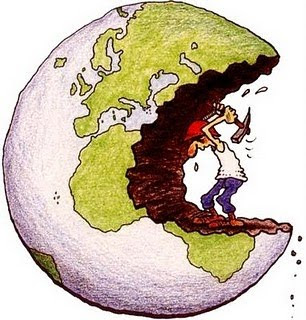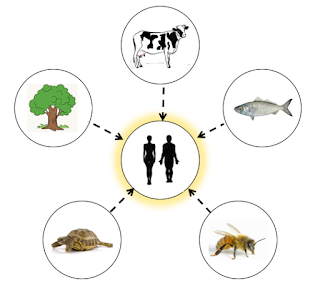Questioning the “exploitation of natural resources”
Text translated by Louise Nicolas-Sourdot
Texte traduit par Louise Nicolas-Sourdot
A few weeks ago, I started
working on an analysis of French secondary school textbooks and how they portray the relationship between humans and nature.
Particularly, I examined an Earth and Life Sciences textbook for 6th
grade, and I obtained rather surprising results that I'm sharing with you in this post.
In this textbook, the
relationships between humans and nature are a rather secondary subject. Nonetheless,
when these relationships are addressed, it is through the idea of the “exploitation
of natural resources”. Apparently, one of the main learning objectives for the Earth
and Life Sciences program in French secondary school is the understanding of the “impacts
of the exploitation of natural resources”.
What I would like to illustrate
in this text is that this notion is far from being neutral, it symbolizes a strictly utilitarian and objectifying vision of nature, that is quite characteristic of western culture. These are values at the root of the current ecological crisis.
Firstly, speaking about the "exploitation of natural resources" creates a specific frame
for understanding human-nature relationships, a frame which evokes the understanding that “nature is a collection of resources” (Gudynas, 2010). In this understanding,
nature is an ensemble of resources that can be extracted and used to serve
humans. The main point is that this is the only kind of relationship that is recognized, so that any other kind of relationship, such as admiration for nature, nature as a source of meaning and as a source of improved mental health, are absent, and in this way they are not taught to children and adolescents. All they receive is the understanding that we humans exploit natural resources and that is all there is to it.
Let us take a closer look.
Firstly, the notion of exploitation means “to use something to one’s advantage”
(Larousse). Likewise, the verb “to use” can be defined as “to make something
useful; to serve to an end”. This situates us instantly in a utilitarian
frame, in which our relationship to nature is conceived as being
unidirectional: nature serves humans, and never the other way around. Reciprocity is a value that has been found to be central in certain indigenous communities, for example those of North America (Harris and Wasilewski, 2004). Reciprocity is a value in which relationships are thought to be bidirectional in order to be balanced, in the understanding that unidirectional relationships tend to work for the detriment of one of the parties and the benefit of the other. This is commonly what happens in people with narcissistic disorder, they treat other people as means for their own ends and do not believe that they have to give something back in order to balance the relationship or reach a certain harmony.
In addition, the concept of "natural resources" can be analyzed by means of the linguistic
notion of “the trace” (Stibbe, 2015). The trace
happens when a discourse represents the living world in a way which
obscures it and conceals it, leaving just a faint trace rather than a vivid
image. In this case, we
may think that “somewhere” in the concept of “natural resources” - but hardly
noticeable – there are trees, birds, bees, foxes, etc.; intentional subjects
living their own lives. However, describing them as natural resources makes us think of them more as a pile of inert objects, such as a mining site that we extract.
On the other hand, the concept
of “natural resources” can also be analyzed as a mass noun. A mass noun is an abstract concept that
generalizes and homogenizes a group of entities. Arran Stibbe (2015) states
that “when trees, plants and animals are represented in mass nouns, they are
erased, becoming mere tonnages of stuff.”
If we think about it, whenever
we speak about “resources”, it naturally relates to complements of
quantity: “abundant resources”; “scarce resources”; “depleted resources”. For
this reason, moral judgments associated with “resources” are made in
quantitative terms. In other words, when resources are abundant it is good, and
when resources are depleted it is bad. In the same manner, “exploiting natural
resources” becomes the normal and acceptable act, and “overexploiting natural resources”
becomes a morally reprehensible act. In doing so, the hidden “trace”
is the fact that whenever activities of “natural resource extraction” are executed,
animals and plants are killed, at the same time as their habitats are destroyed.
Furthermore, for many people
nature is beautiful, it deserves respect, and it is also a source of
inspiration. In other words, there are not only quantitative values but also qualitative values that are associated with the contributions of nature and ecosystems to our life quality. When speaking about “resources”, those emotional and aesthetic
relationships are cancelled. It is
semantically not possible to speak about a “beautiful resource”, a “resource
that deserves respect”, and even less about an “inspirational resource”.
To sum up, talking about “the
exploitation of natural resources” implies treating nature as an object that
can be manipulated and used in order to serve humans’ interests (Gudynas, 2010).
This notion establishes a one-way relationship between us and nature, in which
we can profit from the services it provides us without having to reciprocate. Moreover,
by reducing nature to an object, we forget about the fact that nature is
composed of conscious beings, who want to persevere in their existence.
In this way, middle-schoolers
throughout France are taught that the essential way to relate with nature is by
exploiting it as we please. In so doing, this type of language reproduces and
reinforces one of the main values at the root of the current ecological crisis.
References
Gudynas, E. (2010). Imágenes, ideas y conceptos sobre la naturaleza en América Latina. Cultura y naturaleza, 267-292.
Harris, L. D., & Wasilewski, J. (2004). Indigeneity, an alternative worldview: Four R's (relationship, responsibility, reciprocity, redistribution) vs. two P's (power and profit). Sharing the journey towards conscious evolution. Systems Research and Behavioral Science: The Official Journal of the International Federation for Systems Research, 21(5), 489-503.
Stibbe, A. (2015). Ecolinguistics: Language, ecology and the stories we live by. Routledge.





Comments
Post a Comment